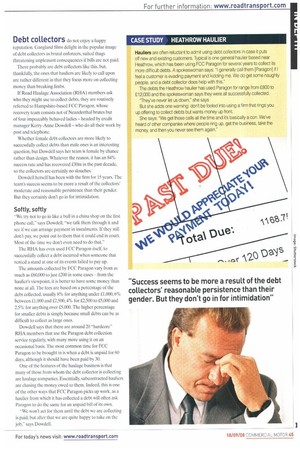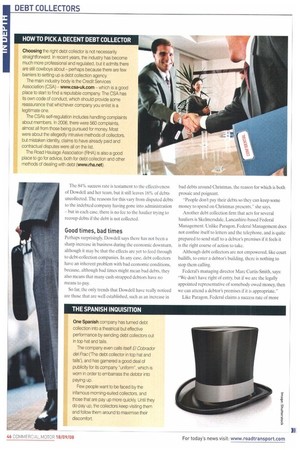n sa
Page 44

Page 45

Page 46

Page 48

If you've noticed an error in this article please click here to report it so we can fix it.
Debt collectors often get an unfair lress for doing their job. We find out how ebt-cottection world works and offer pointers on enlisting their help as well as avoiding the need for them in the first place.
Words; Harris Debt collectors do not enjoy a happy reputation. Gangland films delight in the popular image of debt collectors as brutal enforcers, suited thugs threatening unpleasant consequences if bills are not paid.
There probably are debt collectors like this, but, thankfully, the ones that hauliers arc likely to call upon are rather different in that they focus more on collecting money than breaking limbs.
If Road Haulage Association (RHA) members ask who they might use to collect debts, they are routinely referred to Hampshire-based FCC Paragon, whose recovery team consists not of Neanderthal brutes but of four impeccably behaved ladies — headed by credit manager Kerry-Anne Dowdell — who do all their work by post and telephone.
Whether female debt collectors are more likely to successfully collect debts than male ones is an interesting question, but Dowdell says her team is female by chance rather than design. Whatever the reason, it has an 84% success rate and has recovered 130m in the past decade, so the collectors are certainly no slouches.
Dowdell herself has been with the firm for 15 years. The team's success seems to be more a result of the collectors' moderate and reasonable persistence than their gender. But they certainly don't go in for intimidation.
Softly, softly
"We try not to go in like a bull in a china shop on the first phone call," says Dowdell, "we talk them through it and see if we can arrange payment in instalments. If they still don't pay, we point out to them that it could end in court. Most of the time we don't even need to do that."
The RHA has even used FCC Paragon itself, to successfully collect a debt incurred when someone that rented a stand at one of its events failed to pay up.
The amounts collected by FCC Paragon vary from as much as £60,000 to just 1200 in some cases — from the haulier's viewpoint, it is better to have some money than none at all. The fees are based on a percentage of the debt collected, usually 8% for anything under 11,000, 6% between £1.000 and /2,500, 4% for /2,500 to /5,000 and 2.5% for anything over 15,000. The higher percentage for smaller debts is simply because small debts can be as difficult to collect as large ones.
Dowdell says that there are around 20 "harcicore" RHA members that use the Paragon debt collection service regularly, with many more using it on an occasional basis. The most common time for FCC Paragon to be brought in is when a debt is unpaid for 60 days, although it should have been paid by 30.
One of the features of the haulage business is that many of those from whom the debt collector is collecting are haulage companies. Essentially, subcontracted hauliers are chasing the money owed to them. Indeed, this is one of the other ways that FCC Paragon picks up work, as a haulier from which it has collected a debt will often ask Paragon to do the same for an unpaid bill of its own.
"We won't act for them until the debt we are collecting is paid, but after that we are quite happy to take on the job," says Dowdell. The 84% success rate is testament to the effectiveness of Dowdell and her team, but it still leaves 16% of debts uncollected. The reasons for this vary from disputed debts to the indebted company having gone into administration but in each case, there is no fee to the haulier trying to recoup debts if the debt is not collected.
Good times, bad times
Perhaps surprisingly Dowdell says there has not been a sharp increase in business during the economic downturn, although it may be that the effects are yet to feed through to debt-collection companies. In any case, debt collectors have an inherent problem with bad economic conditions, because, although bad times might mean bad debts, they also means that many cash-strapped debtors have no means to pay.
So far, the only trends that Dowdell have really noticed are those that are well established, such as an increase in had debts around Christmas, the reason for which is both prosaic and poignant.
-People don't pay their debts so they can keep some money to spend on Christmas presents,she says.
Another debt collection firm that acts for several hauliers is Skelmersdale, Lancashire-based Federal Management. Unlike Paragon, Federal Management does not confine itself to letters and the telephone. and is quite prepared to send staff to a debtor's premises if it feels it is the right course of action to take.
Although debt collectors are not empowered, like court bailiffs, to enter a debtor's building, there is nothing to stop them calling.
Federal's managing director Marc Curtis-Smith, says: "We don't have right of entry, but if we are the legally appointed representative of somebody owed money, then we can attend a debtor's premises if it is appropriate."
Like Paragon, Federal claims a success rate of more than 80%, although Curtis-Smith admits that -things can sometimes turn unpleasant" when its staff call on those who owe money.
But Federal's staff are the threatened rather than the threateners, with irate debtors sometimes becoming annoyed that they are being chased on their own turf, says Curtis-Smith.
He adds: -We do come across lunatics from time to time, but if there are threats then our staff just walk away. Debt collectors are just the same as anybody else. We have families, too."
Paragon and Federal Management are similar in that if someone who has the ability to pay persistently refuses to do so, then court action is the final step. Federal operates what it characterises as "a four-letter strategy-, with the third letter being a pre-legal notice and the fourth a formal notice of court action. Paragon says it hardly ever turns away a request to collect a debt, but Federal Management will turn down work if its initial investigations suggest that a debt might be uncollectable.
Commission impossible
If the company does take on work, then a 5% commission on a £5,000 debt would be typical, although it supplements this by levying an extra charge on the debtor as well as the commission from the firm owed the money.
Typically, on a £5,000 debt, this would be £1,000so for every £5,000 collected, Federal Management would make £1250. most of it from the debtor.
Curtis-Smith says: "The reason we don't take on every job is that we don't want to waste hauliers' time. There isn't much point in pursuing a company in liquidation, for example.•












































































































































































